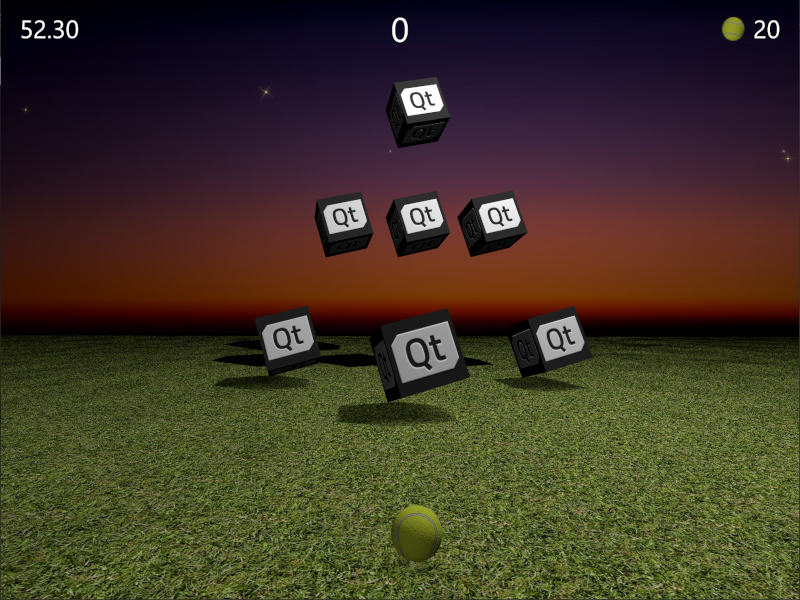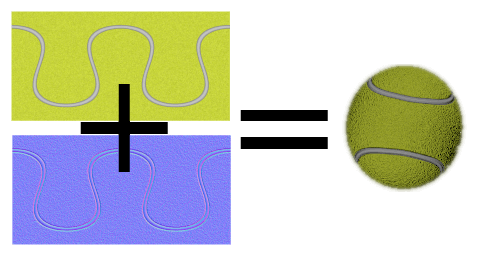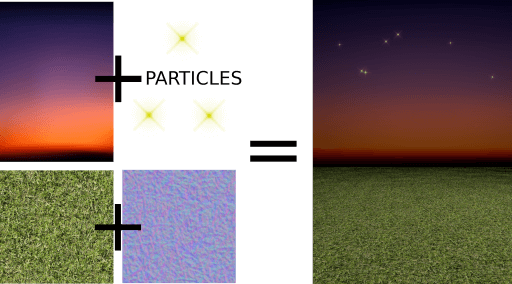Qt Quick 3D - クイックボールの例
Quick3Dを使用して簡単なゲームを作成する方法を説明します。

この例では、Qt Quick とQt Quick 3D を組み合わせて簡単な 3D ゲームを作成する方法を示します。ゲームの目的は、ボールを投げてターゲットボックスに当てることです。どれだけ速く、どれだけ少ないボールで、すべてのターゲットを倒したかによってポイントが与えられます。よく狙いを定めて、素早く!
ソースコードは1つのQMLファイルになっており、このサンプルがいかにコンパクトであるかを強調しています。主なプロパティから見ていきましょう。これらは非常に自明で、ゲームにどのような影響を与えるか簡単に調整できます。
// Scaling helpper readonly property real px: 0.2 + Math.min(width, height) / 800 // This is false until the first game has started property bool playingStarted: false // This is true whenever game is on property bool gameOn: false // Sizes of our 3D models readonly property real ballSize: 40 readonly property real targetSize: 120 // Playing time in seconds readonly property real gameTime: 60 property real currentTime: 0 // Amount of balls per game readonly property int gameBalls: 20 property int currentBalls: 0 // Scores property int score: 0 property int timeBonus: 0 property int ballsBonus: 0
ゲームロジックはJavaScriptで実装されている。View3D 、ゲームを開始する関数があり、必要な変数を(再)初期化し、レベルターゲットを作成する。また、ゲーム終了時に最終得点を計算する関数も含まれています。
function createLevel1() { // Simple level of target items var level1 = [{ "x": 0, "y": 100, "z": -100, "points": 10 }, { "x": -300, "y": 100, "z": -400, "points": 10 }, { "x": 300, "y": 100, "z": -400, "points": 10 }, { "x": -200, "y": 400, "z": -600, "points": 20 }, { "x": 0, "y": 400, "z": -600, "points": 20 }, { "x": 200, "y": 400, "z": -600, "points": 20 }, { "x": 0, "y": 700, "z": -600, "points": 30 }]; targetsNode.addTargets(level1); } function startGame() { ballModel.resetBall(); targetsNode.resetTargets(); createLevel1(); score = timeBonus = ballsBonus = 0; currentBalls = gameBalls; gameOn = true; playingStarted = true; } function endGame() { if (targetsNode.currentTargets == 0) { // If we managed to get all targets down -> bonus points! timeBonus = mainWindow.currentTime; ballsBonus = currentBalls * 10; } gameOn = false; ballModel.resetBall(); }
ビューには、シーンをライトアップするためのPointLight ノードも含まれています。これはオブジェクトの上に配置され、影を落とすように設定されます。ゲームが終了したときに、プレーエリアを暗くするために明るさがどのように使用されているかに注意してください。ambientColor プロパティは、光のコントラストを和らげるために使用されます。このプロパティがないと、オブジェクトの下部が非常に暗くなるからです。
PointLight { x: 400 y: 1200 castsShadow: true shadowMapQuality: Light.ShadowMapQualityHigh shadowFactor: 50 quadraticFade: 2 ambientColor: "#202020" brightness: mainWindow.gameOn ? 200 : 40 Behavior on brightness { NumberAnimation { duration: 1000 easing.type: Easing.InOutQuad } } }
ボールを投げるには、Qt Quick MouseArea 。これは、ゲームがオンで、ボールがまだ動いていないときだけ有効になります。
MouseArea { anchors.fill: parent enabled: mainWindow.gameOn && !ballModel.ballMoving onPressed: { ballModel.moveBall(mouseX, mouseY); } onPositionChanged: { ballModel.moveBall(mouseX, mouseY); } onReleased: { ballModel.throwBall(); } }
次に、実際の3Dモデルに入ります。ボールの挙動やアニメーション、当たり判定などのロジックが含まれています。まずはボールのプロパティを調べてみよう。ボールは組み込みの球体モデルを使用し、ballSize に基づいてスケーリングされます。テニスボールの外観を作成するために、baseColorMap とnormalMap 、PrincipledMaterial を使用しています。

Model { id: ballModel property real directionX: 0 property real directionY: 0 // How many ms the ball flies readonly property real speed: 2000 readonly property real ballScale: mainWindow.ballSize / 100 property var moves: [] readonly property int maxMoves: 5 readonly property bool ballMoving: ballAnimation.running source: "#Sphere" scale: Qt.vector3d(ballScale, ballScale, ballScale) materials: PrincipledMaterial { baseColorMap: Texture { source: "images/ball.jpg" } normalMap: Texture { source: "images/ball_n.jpg" } normalStrength: 1.0 }
マウスを動かすかタッチスクリーンをスワイプすると、ボールを離す前の最後のmaxMoves の位置がmoves 配列に格納されます。ユーザーがボールを離すと、throwBall() が呼び出され、これらの最新の位置からボールの方向を計算し、アニメーションを開始します。
function resetBall() { moves = []; x = 0; y = mainWindow.ballSize/2; z = 400; } function moveBall(posX, posY) { if (!mainWindow.gameOn) return; var pos = view3D.mapTo3DScene(Qt.vector3d(posX, posY, ballModel.z + mainWindow.ballSize)); pos.y = Math.max(mainWindow.ballSize / 2, pos.y); var point = {"x": pos.x, "y": pos.y }; moves.push(point); if (moves.length > maxMoves) moves.shift(); // Apply position into ball model ballModel.x = pos.x; ballModel.y = pos.y; } function throwBall() { if (!mainWindow.gameOn) return; mainWindow.currentBalls--; var moveX = 0; var moveY = 0; if (moves.length >= 2) { var first = moves.shift(); var last = moves.pop(); moveX = last.x - first.x; moveY = last.y - first.y; if (moveY < 0) moveY = 0; } directionX = moveX * 20; directionY = moveY * 4; ballAnimation.start(); }
ボールの位置は、異なる軸の間で別々にアニメーション化されます。これらのアニメーションでは、ボールがどこに移動するかを定義するために、以前に割り当てられたdirectionX とdirectionY を使用します。また、ボールの飛行時間にはspeed を使用します。縦位置には2つの連続したアニメーションがあるので、ボールのバウンスにイージングを使うことができます。位置のアニメーションが終了したら、ボールがまだ残っているか、ゲームを終了すべきかをチェックします。最後に、ユーザーがカーブボールを投げられるように、ボールの回転もアニメーションさせます。
ParallelAnimation { id: ballAnimation running: false // Move forward NumberAnimation { target: ballModel property: "z" duration: ballModel.speed to: -ballModel.directionY * 5 easing.type: Easing.OutQuad } // Move up & down with a bounce SequentialAnimation { NumberAnimation { target: ballModel property: "y" duration: ballModel.speed * (1 / 3) to: ballModel.y + ballModel.directionY easing.type: Easing.OutQuad } NumberAnimation { target: ballModel property: "y" duration: ballModel.speed * (2 / 3) to: mainWindow.ballSize / 4 easing.type: Easing.OutBounce } } // Move sideways NumberAnimation { target: ballModel property: "x" duration: ballModel.speed to: ballModel.x + ballModel.directionX } onFinished: { if (mainWindow.currentBalls <= 0) view3D.endGame(); ballModel.resetBall(); } } NumberAnimation on eulerRotation.z { running: ballModel.ballMoving loops: Animation.Infinite from: ballModel.directionX < 0 ? 0 : 720 to: 360 duration: 10000 / (2 + Math.abs(ballModel.directionX * 0.05)) }
ゲームプレイで重要なのは、ボールがターゲットに当たったことを検出することです。ボールのzの位置が変わるたびに、targets の配列をループして、ボールがどれかに触れているかどうかをfuzzyEquals() を使って検出します。ヒットを検出するたびに、ターゲットhit() 関数を呼び出し、すべてのターゲットがダウンしているかどうかをチェックします。
onZChanged: { // Loop through target items and detect collisions var hitMargin = mainWindow.ballSize / 2 + mainWindow.targetSize / 2; for (var i = 0; i < targetsNode.targets.length; ++i) { var target = targetsNode.targets[i]; var targetPos = target.scenePosition; var hit = ballModel.scenePosition.fuzzyEquals(targetPos, hitMargin); if (hit) { target.hit(); if (targetsNode.currentTargets <= 0) view3D.endGame(); } } }
それからターゲットを切り替える。これらのターゲットは、ヘルパー関数を含むグループ化ノードに動的に生成され、たとえば、すべてのターゲットをグループとしてアニメーションさせることができます。currentTargets プロパティが必要なのは、QML の配列の変更ではバインディングがトリガーされないためです。
Node { id: targetsNode property var targets: [] property int currentTargets: 0 function addTargets(items) { items.forEach(function (item) { let instance = targetComponent.createObject( targetsNode, { "x": item.x, "startPosY": item.y, "z": item.z, "points": item.points}); targets.push(instance); }); currentTargets = targets.length; } function removeTarget(item) { var index = targets.indexOf(item); targets.splice(index, 1); currentTargets = targets.length; } function resetTargets() { while (targets.length > 0) targets.pop().destroy(); currentTargets = targets.length; } }
ターゲットは、立方体モデルと、点を示すためのテキスト要素を持つノードです。ボールモデルと同様に、baseColorMap とnormalMap テクスチャを使用して、Qt ロゴのあるキューブを作成します。ヒットが検出されると、立方体を順次アニメーションさせ、このターゲットから得たポイントを表示します。アニメーションが終了したら、ターゲットノードを動的に削除します。
Component { id: targetComponent Node { id: targetNode property int points: 0 property real hide: 0 property real startPosY: 0 property real posY: 0 property real pointsOpacity: 0 function hit() { targetsNode.removeTarget(this); mainWindow.score += points; hitAnimation.start(); var burstPos = targetNode.mapPositionToScene(Qt.vector3d(0, 0, 0)); hitParticleEmitter.burst(100, 200, burstPos); } y: startPosY + posY SequentialAnimation { running: mainWindow.gameOn && !hitAnimation.running loops: Animation.Infinite NumberAnimation { target: targetNode property: "posY" from: 0 to: 150 duration: 3000 easing.type: Easing.InOutQuad } NumberAnimation { target: targetNode property: "posY" to: 0 duration: 1500 easing.type: Easing.InOutQuad } } SequentialAnimation { id: hitAnimation NumberAnimation { target: targetNode property: "hide" to: 1 duration: 800 easing.type: Easing.InOutQuad } NumberAnimation { target: targetNode property: "pointsOpacity" to: 1 duration: 1000 easing.type: Easing.InOutQuad } NumberAnimation { target: targetNode property: "pointsOpacity" to: 0 duration: 200 easing.type: Easing.InOutQuad } ScriptAction { script: targetNode.destroy(); } } Model { id: targetModel readonly property real targetScale: (1 + targetNode.hide) * (mainWindow.targetSize / 100) source: "#Cube" scale: Qt.vector3d(targetScale, targetScale, targetScale) opacity: 0.99 - targetNode.hide * 2 materials: PrincipledMaterial { baseColorMap: Texture { source: "images/qt_logo.jpg" } normalMap: Texture { source: "images/qt_logo_n.jpg" } normalStrength: 1.0 } Vector3dAnimation on eulerRotation { loops: Animation.Infinite duration: 5000 from: Qt.vector3d(0, 0, 0) to: Qt.vector3d(360, 360, 360) } } Text { anchors.centerIn: parent scale: 1 + targetNode.pointsOpacity opacity: targetNode.pointsOpacity text: targetNode.points font.pixelSize: 60 * mainWindow.px color: "#808000" style: Text.Outline styleColor: "#f0f000" } } }
競技エリアのモデルもいくつか必要です。グラウンド・モデルは、草のテクスチャを拡大縮小した矩形で、より大きな面積を埋めます。
Model { source: "#Rectangle" scale: Qt.vector3d(50, 50, 1) eulerRotation.x: -90 materials: PrincipledMaterial { baseColorMap: Texture { source: "images/grass.jpg" tilingModeHorizontal: Texture.Repeat tilingModeVertical: Texture.Repeat scaleU: 25.0 scaleV: 25.0 } normalMap: Texture { source: "images/grass_n.jpg" } normalStrength: 0.6 } }
空のモデルはさらに奥にあり、空に影が落ちるのは避けたいので、receivesShadows を false に設定します。空には Qt Quick Particlesモジュールを使って星も追加します。他の2DQt Quick 要素と同様に、パーティクルも3Dノード内に直接追加できます。
Model { id: sky property real scaleX: 100 property real scaleY: 20 source: "#Rectangle" scale: Qt.vector3d(sky.scaleX, sky.scaleY, 1) position: Qt.vector3d(0, 960, -2000) // We don't want shadows casted into sky receivesShadows: false materials: PrincipledMaterial { baseColorMap: Texture { source: "images/sky.jpg" } } // Star particles Node { z: 500 y: 30 // Stars are far away, scale up to half the resolution scale: Qt.vector3d(2 / sky.scaleX, 2 / sky.scaleY, 1) ParticleSystem { anchors.horizontalCenter: parent.horizontalCenter anchors.top: parent.top width: 3000 height: 400 ImageParticle { source: "qrc:///particleresources/star.png" rotationVariation: 360 color: "#ffffa0" colorVariation: 0.1 } Emitter { anchors.fill: parent emitRate: 4 lifeSpan: 6000 lifeSpanVariation: 4000 size: 30 sizeVariation: 20 } } } }
地上と空のモデルを組み合わせると、このような3Dワールドになります:

最後に、QtQuick3D.Particles3D モジュールを使って、ターゲットにキラキラを追加します。ParticleSystem3D にはSpriteParticle3D が含まれており、200 と100 のパーティクル・バーストを同時に2つ使用するのに十分な数を割り当てます。ParticleEmitter3D では、パーティクルのスケール、回転、速度、ライフスパンなどの放出プロパティを定義します。また、パーティクルを適切な大きさで下にドラッグするためのGravity3D アフェクタも追加します。
ParticleSystem3D { id: psystem SpriteParticle3D { id: sprite sprite: Texture { source: "images/particle.png" } color: Qt.rgba(1.0, 1.0, 0.0, 1.0) colorVariation: Qt.vector4d(0.4, 0.6, 0.0, 0.0) unifiedColorVariation: true maxAmount: 200 } ParticleEmitter3D { id: hitParticleEmitter particle: sprite particleScale: 4.0 particleScaleVariation: 2.0 particleRotationVariation: Qt.vector3d(0, 0, 180) particleRotationVelocityVariation: Qt.vector3d(0, 0, 250) velocity: VectorDirection3D { direction: Qt.vector3d(0, 300, 0) directionVariation: Qt.vector3d(200, 150, 100) } lifeSpan: 800 lifeSpanVariation: 200 depthBias: 100 } Gravity3D { magnitude: 600 } }
これでゲームの3D部分は終わりです。まだ、時間、スコア、スタートボタンなどを表示するための2DQt Quick 要素が残っています。これは、ゲームにとっては重要ですが、このQuick 3D ドキュメントには関係ありません。
さて、ボールはあなたの側にあります(ダジャレです)。自由にゲームを拡張し、新しい奇抜なレベルを生成してください!
© 2025 The Qt Company Ltd. Documentation contributions included herein are the copyrights of their respective owners. The documentation provided herein is licensed under the terms of the GNU Free Documentation License version 1.3 as published by the Free Software Foundation. Qt and respective logos are trademarks of The Qt Company Ltd. in Finland and/or other countries worldwide. All other trademarks are property of their respective owners.

